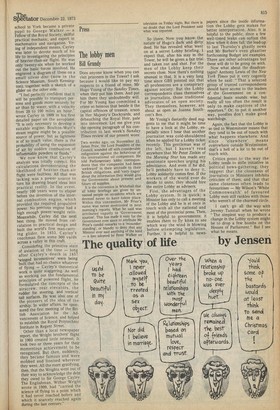The lobby men
Bill Grundy
Does anyone know when you can visit prisoners in the Tower? I ask because I would like to pay my respects to a friend of mine, Mr Hugo Young of the Sunday Times, when they put him there. And put him there they undoubtedly will. For Mr Young has committed a crime so heinous that beside it the capital offences of treason, arson in Her Majesty's Dockyards, and debauching the Royal Heir, pale into innocence. Let me give you the opening paragraph of his contribution to last week's Sunday Times review of our present woes:
Two weeks ago, on November 22, James Prior, the Lord President of the Council, sounded off with considerable indignation against the behaviour of the international oil companies. He told Parliamentary lobby correspondents that the companies had been 'awkward' in their attitude to their British obligations, and 'very cagey' about the information they would give the Government about present and future oil supplies. It is the convention in Whitehall that all lobby briefings are given by unnamed people on occasions which are deemed never to have taken place. Within this convention, Mr Prior's name was never mentioned in next morning's reports. What he said was attributed vaguely to 'Government sources'. This has made it easy for the Government ever since to attribute Mr Prior's candid remarks to a 'misunderstanding', or blandly to deny that any Minister ever said anything of the kind — a line adopted by Peter Walker on television on 'Friday night. But there is no doubt that the Lord President said what was reported.
So there. Now you know the nature of Hugo's dark and dirty deed. He has revealed what went on at a secret Lobby briefing. I expect that, after his stay in the Tower, he will be given a fair trial and taken out and shot. For the men of the Lobby keep their secrets close. Now there's nothing unusual in that. It is a very long time since GBS pointed out that all professions are a conspiracy against society. But the Lobby correspondents class themselves as journalists, those traditional advocates of an open society. They themselves, however, are about as open as Joanna Southcott's Box.
Mr Young's dastardly deed suggests to me that it might be time to have a look at the Lobby, especially since I hear that another journalist was cold-shouldered when he applied for a Lobby ticket recently. This gentleman was of the left, but I haven't read anywhere that Mr Peter Zin kin of the Morning Star has made any passionate speeches urging his admittance. And even if he did, he'll probably have to deny it. Lobby solidarity comes first. If the workers of the world ever do decide to unite, they should hire the entire Lobby as advisers.
First, the advantages of the Lobby system. It is quick; a Minister has only to call a meeting of the Lobby and he is at once in touch with all the national and most of the provintial press. Then, it is helpful to governments; it enables them to fly kites to see which way the wind is blowing before attempting legislation. Further, it is helpful to news
papers since the inside information the Lobby gets makes for better interpretation. Also, it is helpful to the public, since a few well-timed leaks can soften the blow when it does fall; the lead-up to last Thursday's ghastly news and Mr Barber's even ghastlier forthcoming Budget are examples. There are other advantages but these will do to be going on with.
Now what about the disadvantages? Anthony Lewis of the New York Times put it very cogently when he said: "That a selected group of trusted correspondents should have access to the leaders of the Government on a confidential basis sounds wise, but really all too often the result is only to make captives of the reporters." Or, to put it another way, poodles don't make good watchdogs.
Again, the fact that the Lobby is so tied to Westminster means that they tend to be out of touch with what happens elsewhere. And since 'elsewhere' means everywhere outside Westminster, that's a hell of a lot to be out of touch with.
Critics point to the way the Lobby tends to stifle initiative in political news-gathering; they suggest that the closeness of journalists to Ministers inhibits criticism of them, and that that same closeness often leads to favouritism — Mr Wilson's 'White Commonwealth' of favoured Lobby men still rankles with those who weren't of the charmed circle.
I can't go all the way with Jeremy Tunstall when he wrote "The simplest way to produce a change in the Lobby system might be to drop a few bombs on the Houses of Parliament." But I see what he means.


































 Previous page
Previous page